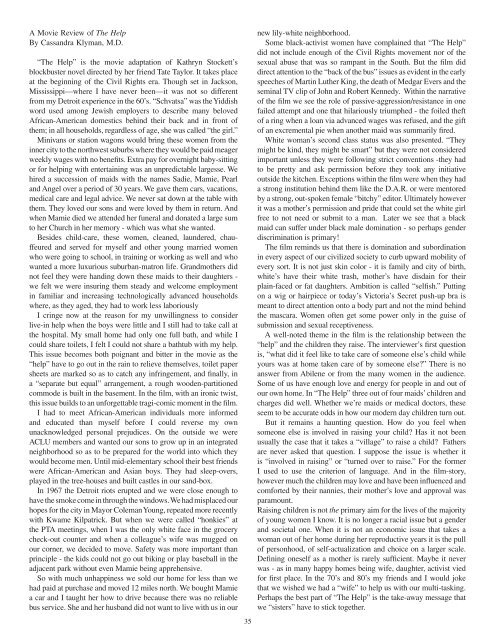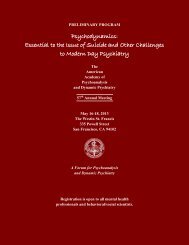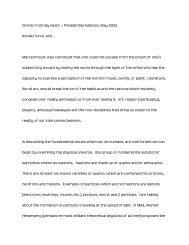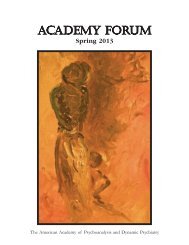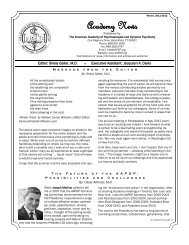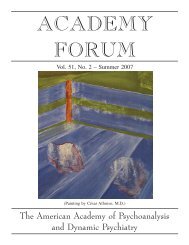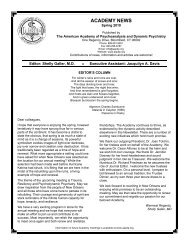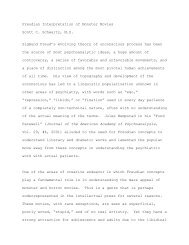ACADEMY FORUM - The American Academy of Psychoanalysis and Dynamic ...
ACADEMY FORUM - The American Academy of Psychoanalysis and Dynamic ...
ACADEMY FORUM - The American Academy of Psychoanalysis and Dynamic ...
Create successful ePaper yourself
Turn your PDF publications into a flip-book with our unique Google optimized e-Paper software.
A Movie Review <strong>of</strong> <strong>The</strong> Help<br />
By Cass<strong>and</strong>ra Klyman, M.D.<br />
“<strong>The</strong> Help” is the movie adaptation <strong>of</strong> Kathryn Stockett’s<br />
blockbuster novel directed by her friend Tate Taylor. It takes place<br />
at the beginning <strong>of</strong> the Civil Rights era. Though set in Jackson,<br />
Mississippi—where I have never been—it was not so different<br />
from my Detroit experience in the 60’s. “Schvatsa” was the Yiddish<br />
word used among Jewish employers to describe many beloved<br />
African-<strong>American</strong> domestics behind their back <strong>and</strong> in front <strong>of</strong><br />
them; in all households, regardless <strong>of</strong> age, she was called “the girl.”<br />
Minivans or station wagons would bring these women from the<br />
inner city to the northwest suburbs where they would be paid meager<br />
weekly wages with no benefits. Extra pay for overnight baby-sitting<br />
or for helping with entertaining was an unpredictable largesse. We<br />
hired a succession <strong>of</strong> maids with the names Sadie, Mamie, Pearl<br />
<strong>and</strong> Angel over a period <strong>of</strong> 30 years. We gave them cars, vacations,<br />
medical care <strong>and</strong> legal advice. We never sat down at the table with<br />
them. <strong>The</strong>y loved our sons <strong>and</strong> were loved by them in return. And<br />
when Mamie died we attended her funeral <strong>and</strong> donated a large sum<br />
to her Church in her memory - which was what she wanted.<br />
Besides child-care, these women, cleaned, laundered, chauffeured<br />
<strong>and</strong> served for myself <strong>and</strong> other young married women<br />
who were going to school, in training or working as well <strong>and</strong> who<br />
wanted a more luxurious suburban-matron life. Gr<strong>and</strong>mothers did<br />
not feel they were h<strong>and</strong>ing down these maids to their daughters -<br />
we felt we were insuring them steady <strong>and</strong> welcome employment<br />
in familiar <strong>and</strong> increasing technologically advanced households<br />
where, as they aged, they had to work less laboriously<br />
I cringe now at the reason for my unwillingness to consider<br />
live-in help when the boys were little <strong>and</strong> I still had to take call at<br />
the hospital. My small home had only one full bath, <strong>and</strong> while I<br />
could share toilets, I felt I could not share a bathtub with my help.<br />
This issue becomes both poignant <strong>and</strong> bitter in the movie as the<br />
“help” have to go out in the rain to relieve themselves, toilet paper<br />
sheets are marked so as to catch any infringement, <strong>and</strong> finally, in<br />
a “separate but equal” arrangement, a rough wooden-partitioned<br />
commode is built in the basement. In the film, with an ironic twist,<br />
this issue builds to an unforgettable tragi-comic moment in the film.<br />
I had to meet African-<strong>American</strong> individuals more informed<br />
<strong>and</strong> educated than myself before I could reverse my own<br />
unacknowledged personal prejudices. On the outside we were<br />
ACLU members <strong>and</strong> wanted our sons to grow up in an integrated<br />
neighborhood so as to be prepared for the world into which they<br />
would become men. Until mid-elementary school their best friends<br />
were African-<strong>American</strong> <strong>and</strong> Asian boys. <strong>The</strong>y had sleep-overs,<br />
played in the tree-houses <strong>and</strong> built castles in our s<strong>and</strong>-box.<br />
In 1967 the Detroit riots erupted <strong>and</strong> we were close enough to<br />
have the smoke come in through the windows. We had misplaced our<br />
hopes for the city in Mayor Coleman Young, repeated more recently<br />
with Kwame Kilpatrick. But when we were called “honkies” at<br />
the PTA meetings, when I was the only white face in the grocery<br />
check-out counter <strong>and</strong> when a colleague’s wife was mugged on<br />
our corner, we decided to move. Safety was more important than<br />
principle - the kids could not go out biking or play baseball in the<br />
adjacent park without even Mamie being apprehensive.<br />
So with much unhappiness we sold our home for less than we<br />
had paid at purchase <strong>and</strong> moved 12 miles north. We bought Mamie<br />
a car <strong>and</strong> I taught her how to drive because there was no reliable<br />
bus service. She <strong>and</strong> her husb<strong>and</strong> did not want to live with us in our<br />
35<br />
new lily-white neighborhood.<br />
Some black-activist women have complained that “<strong>The</strong> Help”<br />
did not include enough <strong>of</strong> the Civil Rights movement nor <strong>of</strong> the<br />
sexual abuse that was so rampant in the South. But the film did<br />
direct attention to the “back <strong>of</strong> the bus” issues as evident in the early<br />
speeches <strong>of</strong> Martin Luther King, the death <strong>of</strong> Medgar Evers <strong>and</strong> the<br />
seminal TV clip <strong>of</strong> John <strong>and</strong> Robert Kennedy. Within the narrative<br />
<strong>of</strong> the film we see the role <strong>of</strong> passive-aggression/resistance in one<br />
failed attempt <strong>and</strong> one that hilariously triumphed - the foiled theft<br />
<strong>of</strong> a ring when a loan via advanced wages was refused, <strong>and</strong> the gift<br />
<strong>of</strong> an excremental pie when another maid was summarily fired.<br />
White woman’s second class status was also presented. “<strong>The</strong>y<br />
might be kind, they might be smart” but they were not considered<br />
important unless they were following strict conventions -they had<br />
to be pretty <strong>and</strong> ask permission before they took any initiative<br />
outside the kitchen. Exceptions within the film were when they had<br />
a strong institution behind them like the D.A.R. or were mentored<br />
by a strong, out-spoken female “bitchy” editor. Ultimately however<br />
it was a mother’s permission <strong>and</strong> pride that could set the white girl<br />
free to not need or submit to a man. Later we see that a black<br />
maid can suffer under black male domination - so perhaps gender<br />
discrimination is primary!<br />
<strong>The</strong> film reminds us that there is domination <strong>and</strong> subordination<br />
in every aspect <strong>of</strong> our civilized society to curb upward mobility <strong>of</strong><br />
every sort. It is not just skin color - it is family <strong>and</strong> city <strong>of</strong> birth,<br />
white’s have their white trash, mother’s have disdain for their<br />
plain-faced or fat daughters. Ambition is called “selfish.” Putting<br />
on a wig or hairpiece or today’s Victoria’s Secret push-up bra is<br />
meant to direct attention onto a body part <strong>and</strong> not the mind behind<br />
the mascara. Women <strong>of</strong>ten get some power only in the guise <strong>of</strong><br />
submission <strong>and</strong> sexual receptiveness.<br />
A well-noted theme in the film is the relationship between the<br />
“help” <strong>and</strong> the children they raise. <strong>The</strong> interviewer’s first question<br />
is, “what did it feel like to take care <strong>of</strong> someone else’s child while<br />
yours was at home taken care <strong>of</strong> by someone else” <strong>The</strong>re is no<br />
answer from Abilene or from the many women in the audience.<br />
Some <strong>of</strong> us have enough love <strong>and</strong> energy for people in <strong>and</strong> out <strong>of</strong><br />
our own home. In “<strong>The</strong> Help” three out <strong>of</strong> four maids’ children <strong>and</strong><br />
charges did well. Whether we’re maids or medical doctors, these<br />
seem to be accurate odds in how our modern day children turn out.<br />
But it remains a haunting question. How do you feel when<br />
someone else is involved in raising your child Has it not been<br />
usually the case that it takes a “village” to raise a child Fathers<br />
are never asked that question. I suppose the issue is whether it<br />
is “involved in raising” or “turned over to raise.” For the former<br />
I used to use the criterion <strong>of</strong> language. And in the film-story,<br />
however much the children may love <strong>and</strong> have been influenced <strong>and</strong><br />
comforted by their nannies, their mother’s love <strong>and</strong> approval was<br />
paramount.<br />
Raising children is not the primary aim for the lives <strong>of</strong> the majority<br />
<strong>of</strong> young women I know. It is no longer a racial issue but a gender<br />
<strong>and</strong> societal one. When it is not an economic issue that takes a<br />
woman out <strong>of</strong> her home during her reproductive years it is the pull<br />
<strong>of</strong> personhood, <strong>of</strong> self-actualization <strong>and</strong> choice on a larger scale.<br />
Defining oneself as a mother is rarely sufficient. Maybe it never<br />
was - as in many happy homes being wife, daughter, activist vied<br />
for first place. In the 70’s <strong>and</strong> 80’s my friends <strong>and</strong> I would joke<br />
that we wished we had a “wife” to help us with our multi-tasking.<br />
Perhaps the best part <strong>of</strong> “<strong>The</strong> Help” is the take-away message that<br />
we “sisters” have to stick together.


